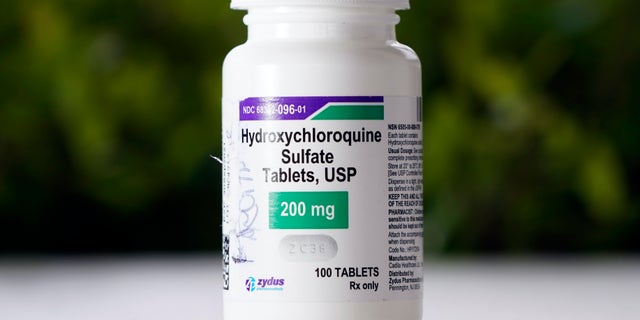Get all the latest news on coronavirus and more delivered daily to your inbox. Sign up here.
A study of COVID-19 patients in China who received hydroxychloroquine showed the anti-malarial drug did not clear the patients of the virus.
“The overall 28-day negative conversion rate was not different between [standard-of-care] plus [hydroxychloroquine and standard-of-care] group (Kaplan-Meier estimates 85.4% versus 81.3%, P=0.341),” researchers wrote in the study. “Negative conversion rate at day 4, 7, 10, 14 or 21 was also similar between the two groups. No different 28-day symptoms alleviation rate was observed between the two groups.”
The research consisted of 150 patients who were hospitalized with COVID-19, the disease caused by the novel coronavirus. It has not yet been peer-reviewed and was published earlier this month on the medXiv repository.



A bottle of hydroxychloroquine is displayed on a table outside The Resort at Texas City nursing home Tuesday, April 7, 2020, in Texas City, Texas. Dr. Robin Armstrong, the home’s medical director, is treating nearly 30 residents of the nursing home with the anti-malaria drug hydroxychloroquine, which is unproven against COVID-19 even as President Donald Trump heavily promotes it as a possible treatment. Armstrong said Trump’s championing of the drug is giving doctors more access to try it on coronavirus patients. More than 80 residents and workers have tested positive for the coronavirus at the facility. (AP Photo/David J. Phillip)
JEFF BEZOS MAKES VISIT TO AMAZON, WHOLE FOODS STORES AS SCRUTINY OVER WORKERS’ SAFETY INTENSIFIES
Despite not clearing the patients of the virus, the researchers noted the drug, touted by President Trump as a “game-changer,” did alleviate some symptoms.
“The administration of [hydroxychloroquine] did not result in a higher negative conversion rate but more alleviation of clinical symptoms than [standard-of-care] alone in patients hospitalized with COVID-19 without receiving antiviral treatment, possibly through anti-inflammatory effects,” researchers added. The doctors also observed a “normalization of C-reactive protein and blood lymphocyte count” within the 28-day period.
The study was conducted at 16 treatment centers in China through Feb. 11 to 29, 2020 and 75 patients received the drug and 75 received standard-of-care.
There were some side effects in the group of 75 who took the drug, first used for malaria nearly 70 years ago, but most were mild, the most common being diarrhea, at 10 percent of patients.
CORONAVIRUS PATIENT SAYS HYDROXYCHLOROQUINE SAVED HIS LIFE
The Food and Drug Administration recently announced an emergency use authorization to try several drugs, including hydroxychloroquine and chloroquine, in an effort to combat COVID-19, despite a lack of clear evidence of their effectiveness.
A study in Brazil testing chloroquine in COVID-19 patients had to be stopped earlier this week after patients who took high doses of the drug developed dangerous heart rhythm problems.
Last month, the University of Washington and New York University announced an eight-week study that aims to determine whether hydroxychloroquine can prevent COVID-19.
A study published in March by French researchers suggested that COVID-19 patients could be treated with antimalarial medication and antibiotics in the battle against the novel coronavirus.
New York State recently started coronavirus drug trials in an attempt to control the pandemic’s impact on the state, according to Gov. Andrew Cuomo, who announced the state had acquired 70,000 doses of hydroxychloroquine, 10,000 doses of zithromax and 750,000 doses of chloroquine.
Hydroxychloroquine and chloroquine are antimalarial drugs. No drug should be taken without a doctor’s prescription.
CLICK HERE FOR COMPLETE CORONAVIRUS COVERAGE
As of Tuesday morning, more than 2 million coronavirus cases have been diagnosed worldwide, including more than 609,000 in the U.S., the most impacted country on the planet.
GET THE FOX NEWS APP
Fox News’ Edmund DeMarche and James Rogers contributed to this story.

